人教新课标高中英语必修五 Unit3 Life in the future Past participle used as adverbial and attribute 课件(共34张PPT)
文档属性
| 名称 | 人教新课标高中英语必修五 Unit3 Life in the future Past participle used as adverbial and attribute 课件(共34张PPT) |

|
|
| 格式 | zip | ||
| 文件大小 | 1.6MB | ||
| 资源类型 | 教案 | ||
| 版本资源 | 人教版(新课程标准) | ||
| 科目 | 英语 | ||
| 更新时间 | 2019-12-14 00:00:00 | ||
图片预览

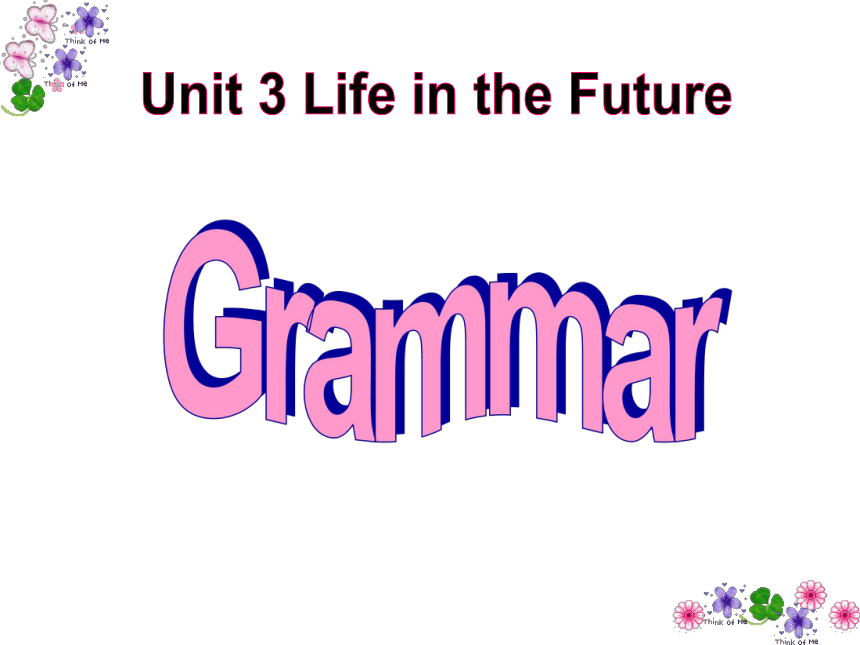
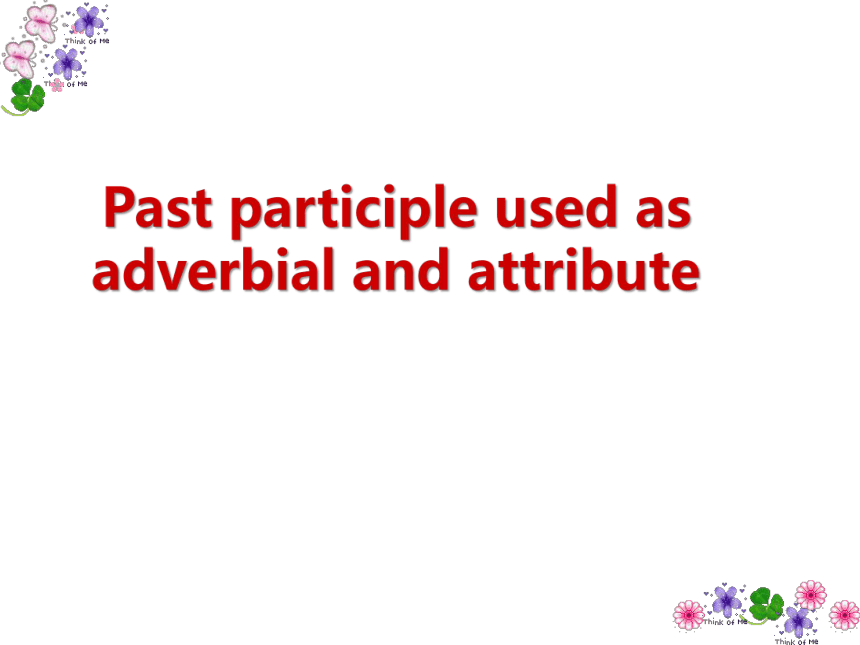
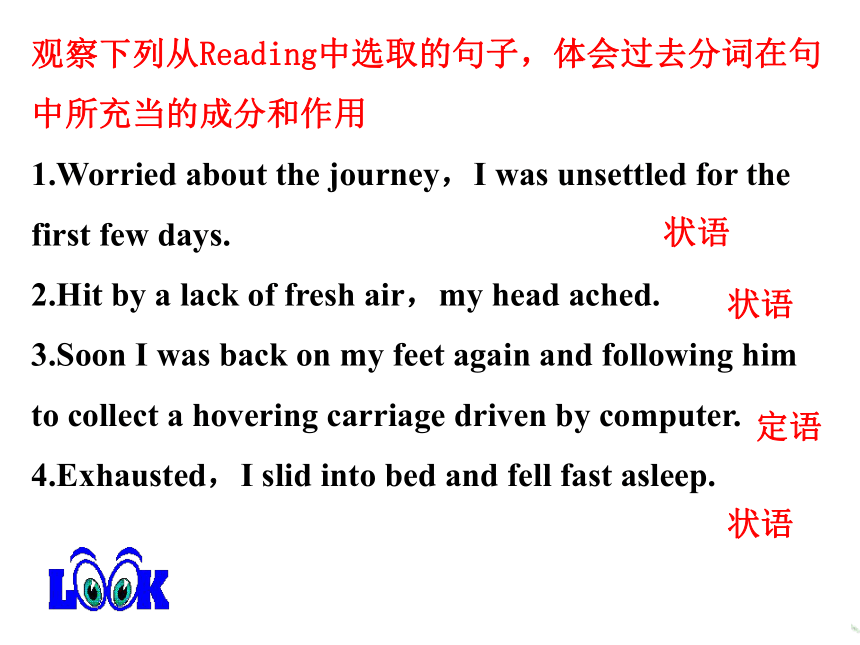
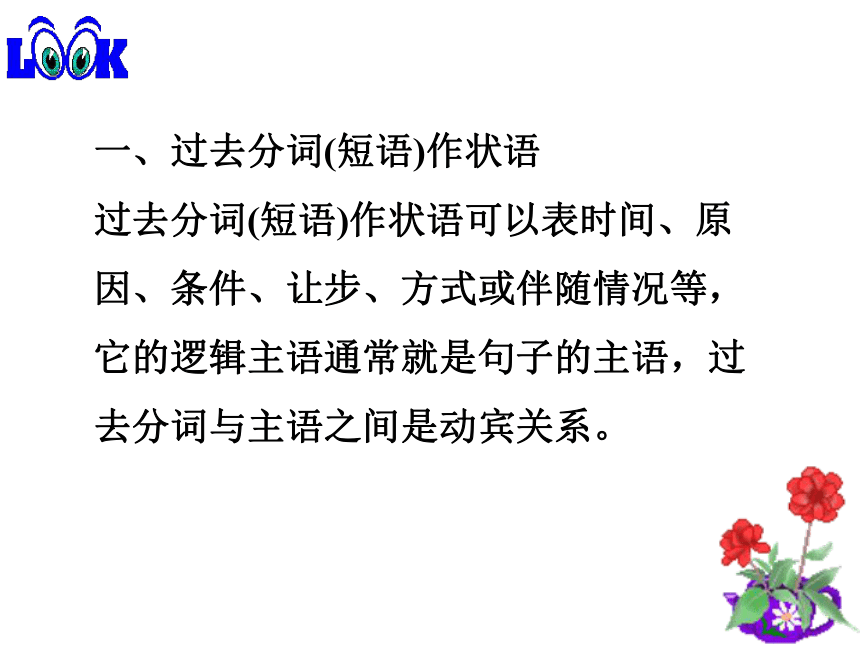
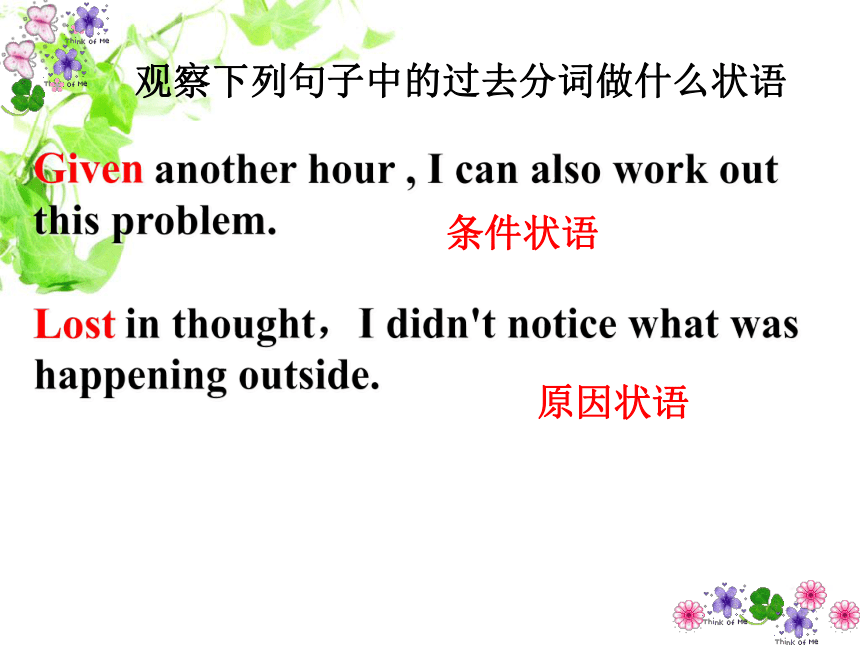
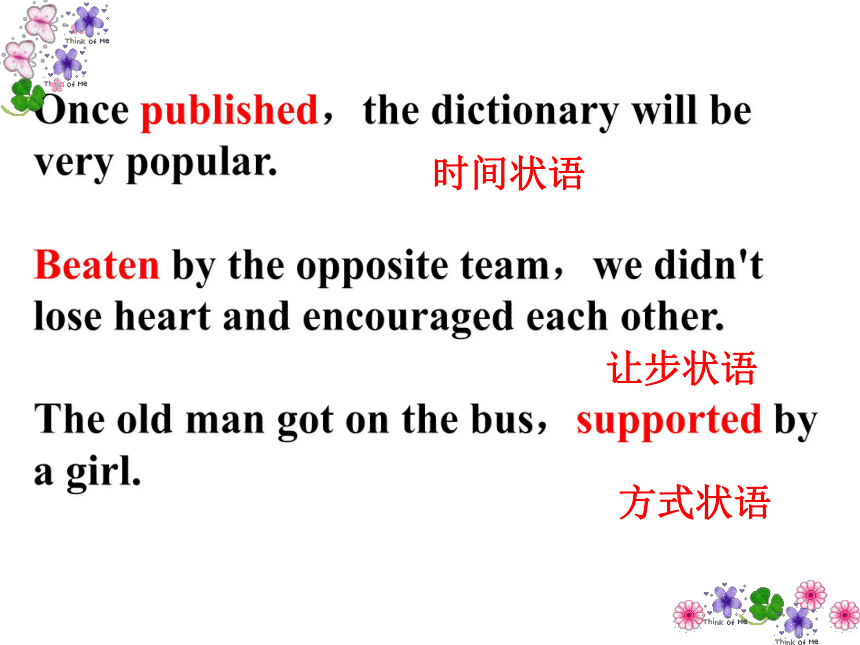
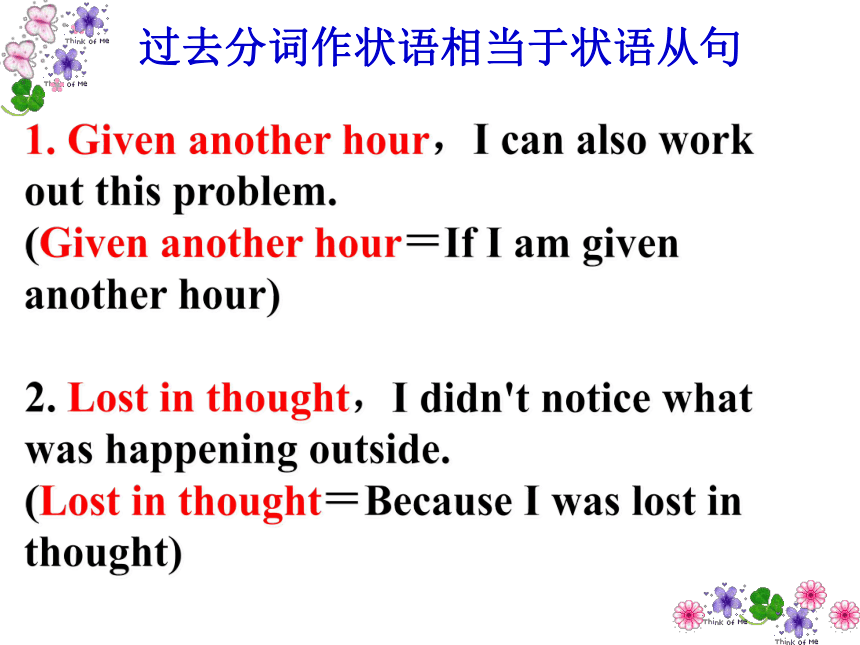
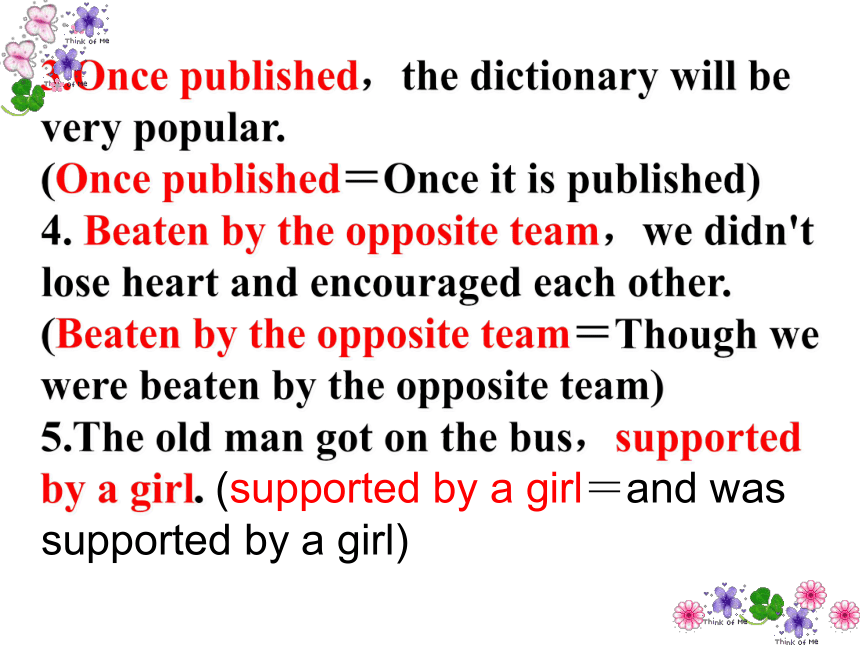
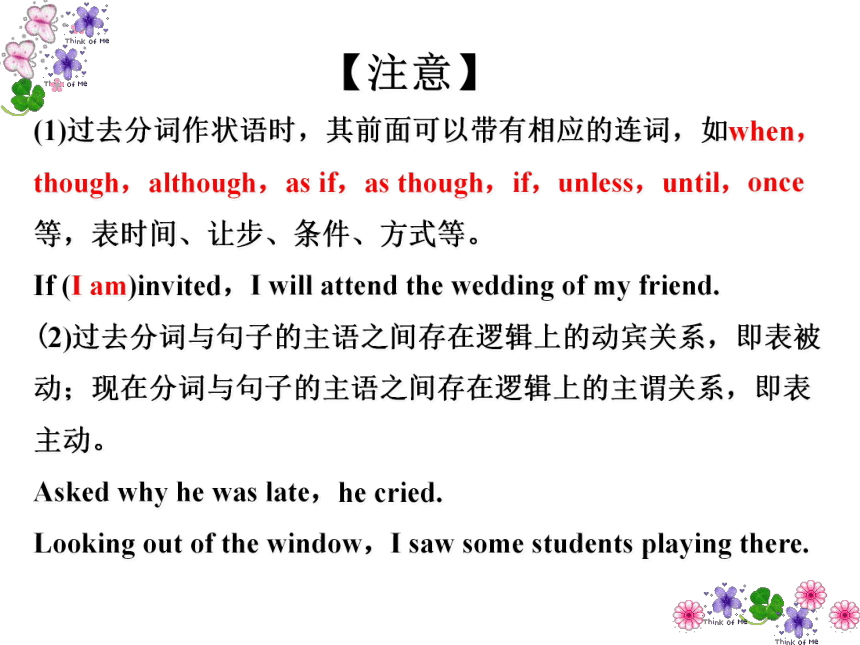
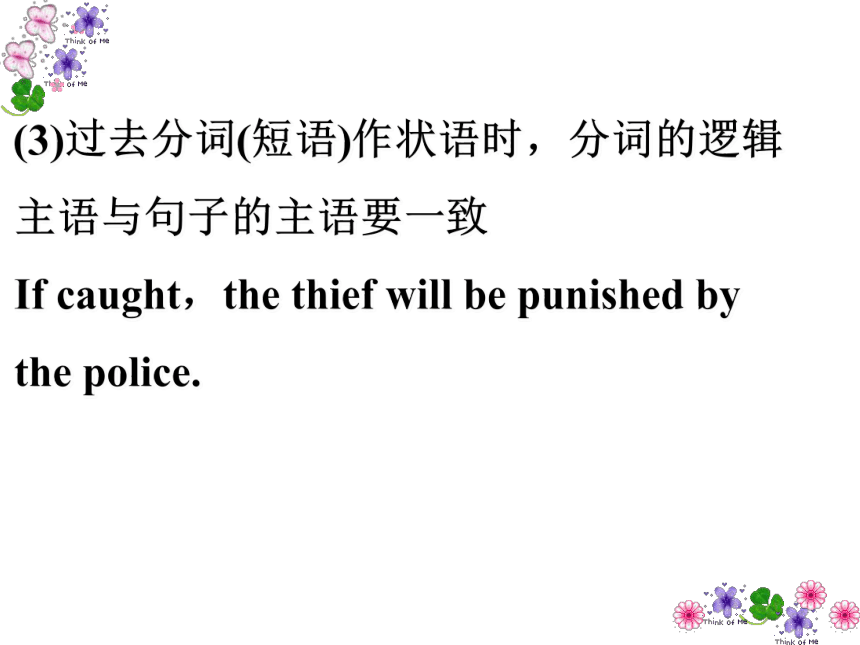
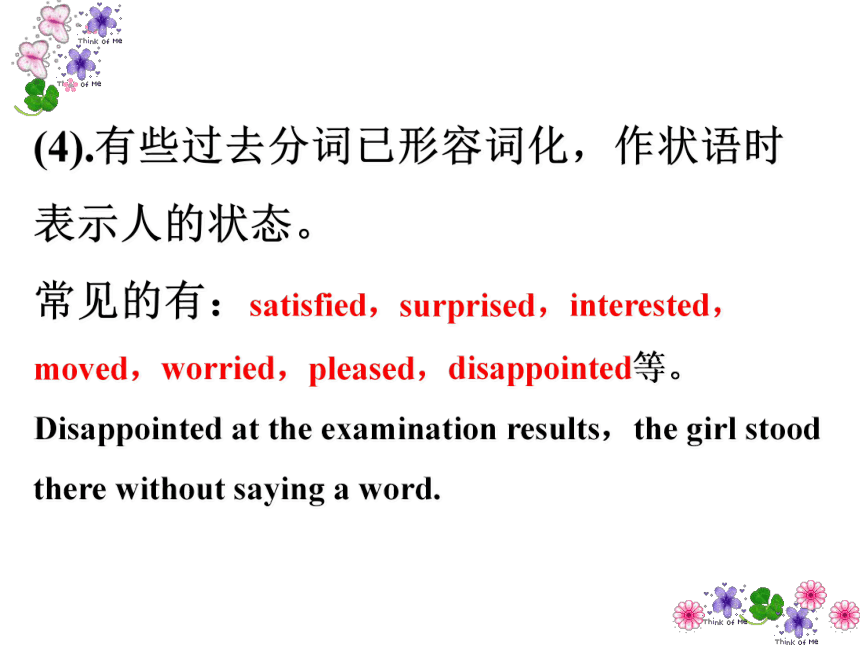
文档简介
(共34张PPT)
人教课标
高二 必修 5
Unit 3
人教课标
高二 必修 5
Unit 3
Past participle used as adverbial and attribute
观察下列从Reading中选取的句子,体会过去分词在句中所充当的成分和作用
1.Worried about the journey,I was unsettled for the first few days.
2.Hit by a lack of fresh air,my head ached.
3.Soon I was back on my feet again and following him
to collect a hovering carriage driven by computer.
4.Exhausted,I slid into bed and fell fast asleep.
状语
状语
定语
状语
一、过去分词(短语)作状语
过去分词(短语)作状语可以表时间、原因、条件、让步、方式或伴随情况等,它的逻辑主语通常就是句子的主语,过去分词与主语之间是动宾关系。
Given another hour , I can also work out this problem.
Lost in thought,I didn't notice what was happening outside.
观察下列句子中的过去分词做什么状语
条件状语
原因状语
Once published,the dictionary will be very popular.
Beaten by the opposite team,we didn't lose heart and encouraged each other.
The old man got on the bus,supported by a girl.
时间状语
让步状语
方式状语
1. Given another hour,I can also work out this problem.
(Given another hour=If I am given another hour)
2. Lost in thought,I didn't notice what was happening outside.
(Lost in thought=Because I was lost in thought)
过去分词作状语相当于状语从句
3.Once published,the dictionary will be very popular.
(Once published=Once it is published)
4. Beaten by the opposite team,we didn't lose heart and encouraged each other.
(Beaten by the opposite team=Though we were beaten by the opposite team)
5.The old man got on the bus,supported by a girl. (supported by a girl=and was supported by a girl)
【注意】
(1)过去分词作状语时,其前面可以带有相应的连词,如when,though,although,as if,as though,if,unless,until,once等,表时间、让步、条件、方式等。
If (I am)invited,I will attend the wedding of my friend.
(2)过去分词与句子的主语之间存在逻辑上的动宾关系,即表被动;现在分词与句子的主语之间存在逻辑上的主谓关系,即表主动。
Asked why he was late,he cried.
Looking out of the window,I saw some students playing there.
(3)过去分词(短语)作状语时,分词的逻辑主语与句子的主语要一致
If caught,the thief will be punished by the police.
(4).有些过去分词已形容词化,作状语时表示人的状态。
常见的有:satisfied,surprised,interested,moved,worried,pleased,disappointed等。
Disappointed at the examination results,the girl stood there without saying a word.
Join these sentences using the past participle as adverbial.
1.I was frightened by the loud noise. I went to see what
was happening.
2. He was hit by the lack of the fresh air. He got a
bad headache.
Frightened by the loud noise, I went to see what
was happening.
Hit by the lack of the fresh air, he got a
bad headache.
3.If (I am)invited,I will attend the wedding of my friend.
4.As it was written in a hurry, this article was not so good.
If invited,I will attend the wedding of my friend.
Written in a hurry, this article was not so good.
5.George was exhausted after a day's work. He took some
tablets to help him feel better.
6. He was interrupted by the bell. He was unable to
finish his speech.
Exhausted after a day's work, he took some
tablets to help him feel better.
Interrupted by the bell, he was unable to
finish his speech.
Rewrite with proper conjunctions
1. United we stand, divided we fail.
If we are united, we will stand, but if we are divided, we will fail.
Example:
2. Asked what had happened, he told us about it.
→When he was asked what had happened, he told us about it.
3. Well known for his expert advice, he received many invitations to give lectures.
→Because he was well known for his expert advice, he received many invitations to give lectures.
4. Given more time, we would be able to do the work much better.
If we were given more time, we would be able to do the work much better.
5. Once translated into Chinese, the book became very popular among Chinese teenagers.
Once it was translated into Chinese, the book became very popular among Chinese teenagers.
6. Left alone at home, Sam did not feel afraid at all.
Although he was left alone at home,Sam did not feel afraid at all.
二、过去分词作定语
1.一般来说,过去分词作定语时含有“完成”和“被动”的双重意义。但要注意不及物动词的过去分词常表示“完成”的动作,而不表示“被动”意义
boiled water(开水);fallen leaves(落叶);
risen sun(升起的太阳)
My parents are both retired teachers.
2.单个的过去分词作定语时,一般放在被修饰词之前
a broken vase, a stolen watch
spoken English iced beer
fried chips
3.过去分词短语用作定语时,一般置于其所修饰的名词之后,其意义相当于一个定语从句
A letter posted today will reach him the day after tomorrow.
被动=
A letter which was posted today will reach him tomorrow.
He worked as a worker building roads. (主动) =
He worked as a worker who/ that built roads.
This is a picture painted by my father. (被动) =
This is a picture which was painted by my father.
如果被修饰的词是由every/some/any/no + thing/body/one所构成的复合代词或指示代词those等时,即使一个单一的分词作形容词用,也要放在被修饰词的后面。 例如:
Is there anything unsolved?
There is noting changed here since I left this town.
注意:
1. I like reading the novels ______ (write ) by Zhang Ailing.
2. The girl ______ (write) a letter in the study is my cousin.
3.There is something wrong with my car and I have to get it _______ (repair).4. I want the doors of my new house ______ (paint) white.
5. There was a ________ (surprise) look on his face.
written
writing
repaired
Filling in the blanks.
painted
surprised
用所给单词的适当形式填空
1. Well ________ (manage), his business soon took off.
2. The woman scientist entered the room, ________ (follow) by her assistants.
3. ________ (weaken) by successive storms, the bridge was no longer safe.
4. ________ (support) by a girl, the old man got off the bus.
5. ________(take) 30 minutes before each meal , the medicine is very effective against the illness.
6. ________(face) with the increasing unemployment, many people went on strike in most of the European countries.
managed
followed
Weakened
Supported
Taken
Faced
7. ________(warn) that the Youth Olympic Games might be delayed due to sever e air pollution, our government has made a promise to Jacques Rogge that they will spare no effort to settle the problem.
8. What surprised me most was that there appeared a ________ (surprise)look on her face on hearing the unexpected news.
9. The book ________(refer) at the meeting is popular among teenagers.
Warned
surpried
referred
1. When first ___ to the market, these products enjoyed great success.
A. introducing B. introduced
C. introduce D. being introduced
Choose the best answer.
2. Don’t use words, expressions, or phrases ____ only to people with specific knowledge.
A. being known
B. having been known
C. to be known
D. known
3. All of us were _____ by the _______ question ___ by a little girl.
A. puzzled, puzzling, rose
B. puzzling, puzzled, raised
C. puzzled, puzzling, raised
D. Puzzled, puzzled, lifted
4. _____ black and blue, the lady couldn’t move.
A. Beaten B. Beating
C. To be beaten D. To beat
5. ________ everywhere, the wolves
had no where ________ themselves.
A. Hunting, hiding B. To hunt, to hide
C. Hunted, hiding D. Hunted, to hide
6. What’s the language ____ in Germany?
A. speaking B. spoken
C. be spoken D. to speak
Homework
1. Finish the exercise 2 and 3 on P21
2. Preview the reading passage on P22
人教课标
高二 必修 5
Unit 3
人教课标
高二 必修 5
Unit 3
Past participle used as adverbial and attribute
观察下列从Reading中选取的句子,体会过去分词在句中所充当的成分和作用
1.Worried about the journey,I was unsettled for the first few days.
2.Hit by a lack of fresh air,my head ached.
3.Soon I was back on my feet again and following him
to collect a hovering carriage driven by computer.
4.Exhausted,I slid into bed and fell fast asleep.
状语
状语
定语
状语
一、过去分词(短语)作状语
过去分词(短语)作状语可以表时间、原因、条件、让步、方式或伴随情况等,它的逻辑主语通常就是句子的主语,过去分词与主语之间是动宾关系。
Given another hour , I can also work out this problem.
Lost in thought,I didn't notice what was happening outside.
观察下列句子中的过去分词做什么状语
条件状语
原因状语
Once published,the dictionary will be very popular.
Beaten by the opposite team,we didn't lose heart and encouraged each other.
The old man got on the bus,supported by a girl.
时间状语
让步状语
方式状语
1. Given another hour,I can also work out this problem.
(Given another hour=If I am given another hour)
2. Lost in thought,I didn't notice what was happening outside.
(Lost in thought=Because I was lost in thought)
过去分词作状语相当于状语从句
3.Once published,the dictionary will be very popular.
(Once published=Once it is published)
4. Beaten by the opposite team,we didn't lose heart and encouraged each other.
(Beaten by the opposite team=Though we were beaten by the opposite team)
5.The old man got on the bus,supported by a girl. (supported by a girl=and was supported by a girl)
【注意】
(1)过去分词作状语时,其前面可以带有相应的连词,如when,though,although,as if,as though,if,unless,until,once等,表时间、让步、条件、方式等。
If (I am)invited,I will attend the wedding of my friend.
(2)过去分词与句子的主语之间存在逻辑上的动宾关系,即表被动;现在分词与句子的主语之间存在逻辑上的主谓关系,即表主动。
Asked why he was late,he cried.
Looking out of the window,I saw some students playing there.
(3)过去分词(短语)作状语时,分词的逻辑主语与句子的主语要一致
If caught,the thief will be punished by the police.
(4).有些过去分词已形容词化,作状语时表示人的状态。
常见的有:satisfied,surprised,interested,moved,worried,pleased,disappointed等。
Disappointed at the examination results,the girl stood there without saying a word.
Join these sentences using the past participle as adverbial.
1.I was frightened by the loud noise. I went to see what
was happening.
2. He was hit by the lack of the fresh air. He got a
bad headache.
Frightened by the loud noise, I went to see what
was happening.
Hit by the lack of the fresh air, he got a
bad headache.
3.If (I am)invited,I will attend the wedding of my friend.
4.As it was written in a hurry, this article was not so good.
If invited,I will attend the wedding of my friend.
Written in a hurry, this article was not so good.
5.George was exhausted after a day's work. He took some
tablets to help him feel better.
6. He was interrupted by the bell. He was unable to
finish his speech.
Exhausted after a day's work, he took some
tablets to help him feel better.
Interrupted by the bell, he was unable to
finish his speech.
Rewrite with proper conjunctions
1. United we stand, divided we fail.
If we are united, we will stand, but if we are divided, we will fail.
Example:
2. Asked what had happened, he told us about it.
→When he was asked what had happened, he told us about it.
3. Well known for his expert advice, he received many invitations to give lectures.
→Because he was well known for his expert advice, he received many invitations to give lectures.
4. Given more time, we would be able to do the work much better.
If we were given more time, we would be able to do the work much better.
5. Once translated into Chinese, the book became very popular among Chinese teenagers.
Once it was translated into Chinese, the book became very popular among Chinese teenagers.
6. Left alone at home, Sam did not feel afraid at all.
Although he was left alone at home,Sam did not feel afraid at all.
二、过去分词作定语
1.一般来说,过去分词作定语时含有“完成”和“被动”的双重意义。但要注意不及物动词的过去分词常表示“完成”的动作,而不表示“被动”意义
boiled water(开水);fallen leaves(落叶);
risen sun(升起的太阳)
My parents are both retired teachers.
2.单个的过去分词作定语时,一般放在被修饰词之前
a broken vase, a stolen watch
spoken English iced beer
fried chips
3.过去分词短语用作定语时,一般置于其所修饰的名词之后,其意义相当于一个定语从句
A letter posted today will reach him the day after tomorrow.
被动=
A letter which was posted today will reach him tomorrow.
He worked as a worker building roads. (主动) =
He worked as a worker who/ that built roads.
This is a picture painted by my father. (被动) =
This is a picture which was painted by my father.
如果被修饰的词是由every/some/any/no + thing/body/one所构成的复合代词或指示代词those等时,即使一个单一的分词作形容词用,也要放在被修饰词的后面。 例如:
Is there anything unsolved?
There is noting changed here since I left this town.
注意:
1. I like reading the novels ______ (write ) by Zhang Ailing.
2. The girl ______ (write) a letter in the study is my cousin.
3.There is something wrong with my car and I have to get it _______ (repair).4. I want the doors of my new house ______ (paint) white.
5. There was a ________ (surprise) look on his face.
written
writing
repaired
Filling in the blanks.
painted
surprised
用所给单词的适当形式填空
1. Well ________ (manage), his business soon took off.
2. The woman scientist entered the room, ________ (follow) by her assistants.
3. ________ (weaken) by successive storms, the bridge was no longer safe.
4. ________ (support) by a girl, the old man got off the bus.
5. ________(take) 30 minutes before each meal , the medicine is very effective against the illness.
6. ________(face) with the increasing unemployment, many people went on strike in most of the European countries.
managed
followed
Weakened
Supported
Taken
Faced
7. ________(warn) that the Youth Olympic Games might be delayed due to sever e air pollution, our government has made a promise to Jacques Rogge that they will spare no effort to settle the problem.
8. What surprised me most was that there appeared a ________ (surprise)look on her face on hearing the unexpected news.
9. The book ________(refer) at the meeting is popular among teenagers.
Warned
surpried
referred
1. When first ___ to the market, these products enjoyed great success.
A. introducing B. introduced
C. introduce D. being introduced
Choose the best answer.
2. Don’t use words, expressions, or phrases ____ only to people with specific knowledge.
A. being known
B. having been known
C. to be known
D. known
3. All of us were _____ by the _______ question ___ by a little girl.
A. puzzled, puzzling, rose
B. puzzling, puzzled, raised
C. puzzled, puzzling, raised
D. Puzzled, puzzled, lifted
4. _____ black and blue, the lady couldn’t move.
A. Beaten B. Beating
C. To be beaten D. To beat
5. ________ everywhere, the wolves
had no where ________ themselves.
A. Hunting, hiding B. To hunt, to hide
C. Hunted, hiding D. Hunted, to hide
6. What’s the language ____ in Germany?
A. speaking B. spoken
C. be spoken D. to speak
Homework
1. Finish the exercise 2 and 3 on P21
2. Preview the reading passage on P22
